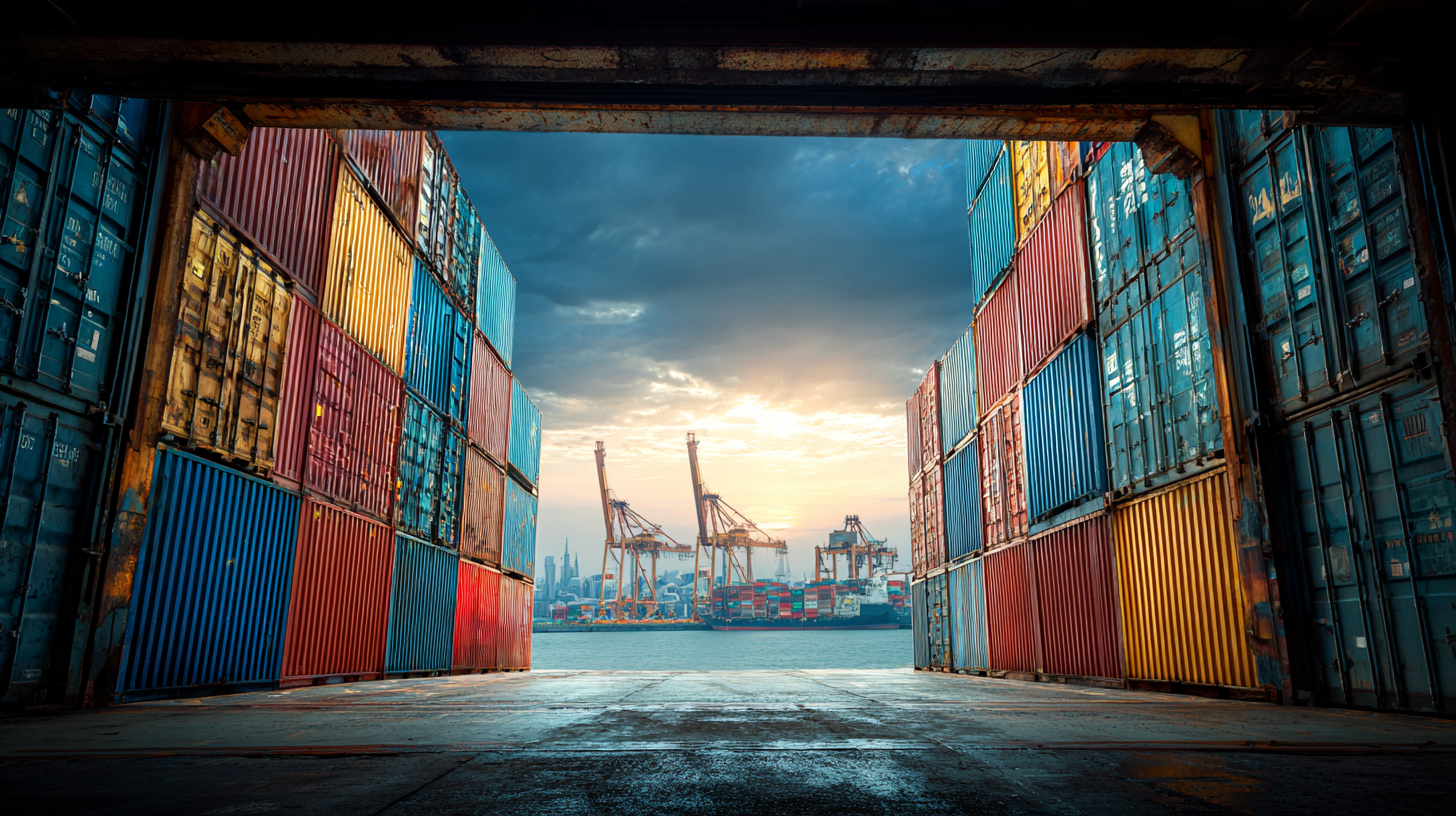Hey there! So, if you think about how everything's connected in the world today, figuring out international trade can be pretty crucial—especially when it comes to following those pesky import-export certification standards for things like sliding doors. You know, Guangzhou Victorydoor Co., Ltd. has really been leading the pack since they started back in 2005. They do it all—making, installing, and even supporting you after the sale of Industrial Doors. And get this: a report from MarketsandMarkets says that the global sliding door market is expected to hit a whopping USD 24 billion by 2025, with a nice growth rate of about 4.5% each year. Pretty impressive, right? This boom is really fueled by more folks wanting energy-efficient and space-saving options at home and in businesses. So, if manufacturers and exporters want to thrive in the international game, they really need to make sure their sliding doors check all the right boxes for those tough certification standards. That way, they can promise quality and safety, which, let’s be honest, makes customers happier and helps them keep up with the competition.

Challenges of Importing Sliding Doors: Compliance and Certification Issues
You know, when it comes to bringing in sliding doors, dealing with all those compliance and certification requirements can feel like wandering through a maze. It’s super important for importers to realize that these doors have to meet a bunch of international standards—these aren’t just for show; they’re all about ensuring safety, quality, and being environmentally friendly. And get this, these rules can really differ depending on which country you’re dealing with. That’s why it’s crucial for businesses to keep themselves in the loop and be proactive about compliance.
Now, one of the biggest things to keep in mind is making sure those sliding doors hit all the local standards as soon as they arrive. We're talking certifications for materials, how they're made, and even how well they perform. If you slip up here, it could mean costly delays, fines, or worst-case scenario—having your goods turned away at customs. Plus, staying on top of any changes in import-export laws or industry standards is key to dodging unnecessary headaches down the line. As the global market changes, businesses working with sliding doors really need to have solid compliance strategies in place to not just get their products into the market, but to help them really shine there.
Understanding International Trade Regulations for Sliding Doors
You know, diving into international trade can feel like wading through a thick swamp, especially when it comes to understanding all the ins and outs of import-export certification standards. This is super important for industries that deal with specialized stuff like sliding doors. These doors not only have to comply with safety and quality regulations, but they also need to meet the different standards set by various countries. Honestly, trying to navigate the maze of international trade regulations can be pretty overwhelming for companies, particularly when they're working hard to make sure their sliding doors tick all the boxes for certifications that guarantee safety and functionality across different markets.

For anyone making or exporting sliding doors, it's really important to keep up with the classification and certifications their products need. These standards usually cover everything from materials to structural integrity and energy efficiency, and trust me, they can really affect how well those doors are received in foreign markets. By putting robust quality control processes in place and getting those necessary certifications, companies can boost their credibility and stand out in the global scene. Plus, having a good grip on these regulations not only makes trade smoother but also helps businesses dodge any messy legal troubles or fines that come with non-compliance.
The Importance of Quality Standards in Sliding Door Manufacturing
When it comes to sliding doors, especially on a global scale, sticking to quality standards is super important. You know, a report from the International Organization for Standardization (ISO) found that products that meet tough quality benchmarks can actually boost market acceptance by about 20%! It's pretty interesting. For sliding doors, making sure they meet those import-export certifications doesn’t just amp up safety and performance; it also helps manufacturers stand out in a crowded field. High-quality sliding doors, built from sturdy materials and designed with precision, usually comply with essential certifications like ISO 9001, guaranteeing consistent quality in how they're made.
**Pro Tip:** When you’re shopping for sliding doors, definitely ask manufacturers for proof that they follow industry standards. Having that paperwork is key to backing up the quality and safety of what you’re buying.
On top of that, sticking to those quality standards can really cut down on returns and boost customer satisfaction. A study by the American National Standards Institute (ANSI) showed that companies that follow high quality practices saw a 15% drop in warranty claims. Considering how much sliding doors get used, making them with durable parts and following quality specs can seriously extend their life.
**Just a tip:** Always check what materials go into making those sliding doors. Doors crafted from high-quality stuff, like tempered glass and stainless steel, not only meet safety standards but also help ensure your product lasts longer.
Navigating International Trade: Quality Standards in Sliding Door Manufacturing
Common Problems Faced by Importers in Sliding Door Trade
You know, when it comes to importing and exporting sliding doors, things can get pretty tricky. I've seen importers struggle with all sorts of challenges, especially when it comes to meeting those tough certification standards. It’s really important that their products are up to snuff in terms of safety and quality. I came across a report from the International Trade Administration that said about 25% of imports get held up because they don’t comply with labeling and certification rules. That can seriously hit businesses right in the wallet.
At Guangzhou Victorydoor Co., Ltd., we've been in the game for over 15 years, so we totally get what these hurdles feel like. We’re all about producing and trading industrial doors, like thermal insulation rolling shutter doors and security fast doors, which makes us a solid partner for importers who need a hand navigating the tricky certification process. Plus, did you know that the sliding door market is expected to hit a whopping USD 17 billion by 2025? That just shows how important it is to stick to import/export standards. By making sure our products tick all the right certification boxes, we help our clients dodge those annoying delays and boost their competitiveness in the market.
Navigating the Certification Process for Best Sliding Doors
Hey there! So, when it comes to getting certification for those top-notch sliding doors, it's super important for manufacturers and exporters, especially if you want to stand out in the competitive global market. Since every country has its own set of rules, figuring out the import-export certification standards is key to making sure you’re playing by the book. Take Guangzhou Victorydoor Co., Ltd. for instance – they’ve been around since 2005 and really know their stuff when it comes to crafting high-quality industrial doors that meet tough guidelines. Their range includes everything from thermal insulation rolling shutter doors to security fast doors and, of course, awesome industrial sliding doors, all designed to stick to international standards, making trade across borders a breeze.
Now, let’s be real: the whole certification process can be a bit of a maze, packed with testing and paperwork that seems never-ending. But here’s the good news – when you focus on quality and safety like Victorydoor does, you’re not just checking boxes; you’re actually going above and beyond those requirements! With their expertise in everything from trade and production to installation and after-sales service, they really help clients cut through the certification clutter, boosting their market presence and trust with customers. That’s why they’ve become such a dependable partner in the global supply chain for industrial doors.
Navigating International Trade: Why Best Sliding Doors Meet Import-Export Certification Standards
| Feature | Certification Standard | Compliance Requirement | Testing Method | Inspection Frequency |
| Thermal Efficiency | ISO 10077-1 | Minimum thermal transmittance ≤ 1.5 W/m2K | Laboratory Testing | Yearly |
| Acoustic Performance | EN ISO 10140 | Minimum Rw ≥ 32 dB | Field Testing | Every 2 years |
| Safety Standards | EN 13126-16 | Mandatory locking mechanisms | Safety Tests | As needed |
| Air Tightness | EN 12207 | Class 2 or higher required | Blower Door Test | Every 5 years |
| Durability | EN 1191 | Minimum resistance for 20,000 cycles | Cycling Test | Yearly |
Strategies for Ensuring Compliance with Import-Export Standards
You know, the world of international trade is always shifting, and keeping up with import-export certification standards is becoming super important. Lately, it seems like countries are really cracking down on regulations to keep their economies stable and ensure national security. Take Malaysia, for example—this country is a big deal in the semiconductor industry, but they saw a 1% drop in chipset exports in 2024. That’s mostly due to stricter regulations and some outside pressures. Being the world’s fourth-largest exporter of chipsets, it’s crucial for them to navigate these compliance issues if they want to hold onto their market share.

On top of that, with tariffs really changing the game, U.S. importers need to get smart about how they handle duty exposure. The global supply chains have gotten pretty complicated, so being proactive about compliance management is key. With new government rules popping up in places like Mexico and Vietnam, businesses really have to keep their ears to the ground about what’s changing. Just look at Vietnam—there are some upcoming tweaks to their food safety laws that means companies will need to adapt quickly. If they don’t, they could face non-compliance issues that really shake things up.
So, by making import-export compliance a priority, businesses can better tackle the twists and turns of international trade and keep things running smoothly in the global market.
Optimize Your Facility's Efficiency with High-Performance Industrial Doors: A Comprehensive Guide
In today's fast-paced industrial environment, optimizing facility efficiency is crucial for maintaining productivity and reducing operating costs. One effective way to enhance your facility's performance is by investing in high-performance industrial doors. These doors not only provide essential protection against harsh weather conditions but also contribute to significant energy savings. With their superior sealing capabilities, high-speed roll-up doors ensure that elements like wind, rain, snow, dirt, and cold stay outside, creating a safe and controlled environment for your operations.
One of the standout features of these high-performance doors is their design, which includes a curtain free of rigid elements. This innovation enhances safety for both staff and equipment. In the event of an accidental dislodging, the door curtain effortlessly reinserts itself into the side guides after just one open and close cycle, minimizing any potential downtime. This means your operations can continue smoothly, without the disruptions typically associated with traditional doors. By streamlining the flow of materials and personnel, high-performance industrial doors significantly boost overall efficiency, allowing your facility to operate at its best.
FAQS
: Understanding international trade regulations is essential for manufacturers of sliding doors to ensure compliance with safety and quality certifications required in different countries, which facilitates smoother trade operations and avoids potential legal issues.
Critical certifications for sliding doors include ISO 9001, which ensures consistent quality in production processes, and other relevant import-export certifications that pertain to safety, structural integrity, and energy efficiency.
Adhering to stringent quality standards can lead to a 20% increase in market acceptance, as products that comply with these standards are seen as safer and more reliable.
Recommended materials for high-quality sliding doors include tempered glass and stainless steel, which not only comply with safety standards but also enhance the longevity and durability of the product.
Manufacturers can enhance their credibility by establishing thorough quality control processes and obtaining relevant certifications that demonstrate their commitment to safety and quality.
Implementing high-quality standards can lead to a 15% reduction in warranty claims, thereby increasing customer satisfaction and reducing returns due to product deficiencies.
Documentation of compliance with industry standards is essential for validating the quality and safety of sliding doors, making it an important factor when selecting manufacturers.
Non-compliance with sliding door regulations can result in legal issues, fines, and setbacks in market acceptance, which can negatively impact a company's reputation and profitability.
Incorporating durable components and adhering to quality specifications substantially increases the lifespan of sliding doors and reduces the likelihood of product returns or warranty claims.
Companies can stay informed about necessary certifications by actively engaging with industry organizations, regulatory bodies, and staying updated on international trade laws that affect their products.
